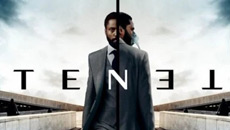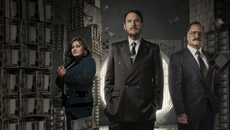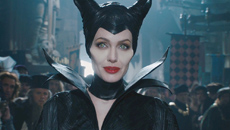
Director: Wally Pfister;
Rating: ***
A tragic love story, constructed on the foundation of, "heal the planet for a better future for all of us", "Transcendence" gives an insight of what would happen to the primitive organic life or "the soul after death". In other words, it is the scientific and technological interpretation of life after death.
Seriously, bordering on ethical issues, this futuristic science-fiction film is laced with romance and political nuances. It is thought-provoking and at the same time a daunting film, suggesting that the internet and technology have irrevocably transformed our relationship with reality in ways, we have only begun to understand.
The plot, in a Silicon Valley scenario, portrays a successful, experimental scientist Will Caster (Johnny Depp) who works alongside with his wife and colleague Evelyn (Rebecca Hall). They delve on Neuro Engineering for the possibilities of transferring intelligence to the digital realm. This they do in order to create a "super-intelligent computer" that would possess the combined intelligence of all the people who have ever lived on Earth. It is like, "Create God, your own God!"
This proclamation is not taken kindly by an anti-technology outfit called RIFT- Revolutionary Independence from Technology, which is led by Bree (Kate Mara).
This extremist faction attacks the scientists and their labs. Will Caster is seriously injured by a poisonous dart and is on his deathbed.
So, he begs his wife to upload his consciousness on his newly invented machine PINN (Physically Independent Neural Network.)
Desperate to keep him around, Evelyn obliges and manages to transplant his consciousness to the network - "cloud", moments before his death.
But when the late Caster's voice emanates from a hard drive, Evelyn's colleagues are wary of the situation wondering if it is really her dead husband, or just a digital representation of him.
Convinced that their lives are in danger in California, Evelyn migrates to a non-descript town in the middle of the desert called Brightwood. Here, with the help of Will, she sets up BDC, Brightwood Data Centre, where with the technology; they "target damaged cells, repair and regenerate them," thus creating "hybrids. This escalates the conflict, reminding you of the theme in "Invasion of the Body Snatchers".
The film struggles to be compelling. With some lyrical imagery created by neat computer generated images that seamlessly merge with cinematographer Jess Hall's artistic frames, the viewing is tedious, because the narration drags and the action graph is not dramatic enough for the adrenaline rush.
The first forty minutes of the film is a dispassionate heavily loaded montage, that include abstract and cliched indistinct code scrolling across various screens. The film only gets interesting once you hear Will, when he helps Evelyn escape her tormentors.
With Johnny Depp morphing into a digital phantom for most part of the film, the emotional quotient is negligible but he exhibits a strong magnetism to his character's arc.
Rebecca Hall is not as effective as Depp. Nevertheless, she offers her best. With an awkward ease, she portrays the quiet idealist as well as an enthusiastic hardcore supporter, which gets confusing at times.
Of the others, Paul Bettany as Will and Evelyn's fellow researcher and colleague Max Waters, Morgan Freeman as mentor, Professor Tagger, Cillian Murphy as FBI agent Buchanan and Kate Mara are wasted as flat-stock characters.
This is cinematographer Wally Pfister's maiden directorial venture which by modern criteria is a stylish off-beat humourless film with an atmosphere of a noir film.







 Tenet Review: An ingenious piece of Nolan's cinematic vision!
Tenet Review: An ingenious piece of Nolan's cinematic vision! 'The Great Heist' Review: A nail-biting Columbian thriller based on a historic robbery
'The Great Heist' Review: A nail-biting Columbian thriller based on a historic robbery Bollywood Stars Who Were Absent from the Big Screen in 2024
Bollywood Stars Who Were Absent from the Big Screen in 2024 Top 10 Bollywood Movies of 2024 - Unforgettable Hits
Top 10 Bollywood Movies of 2024 - Unforgettable Hits Cinematic Gems of India - Highly Acclaimed Regional Movies
Cinematic Gems of India - Highly Acclaimed Regional Movies Reynolds, Lively at war over children?
Reynolds, Lively at war over children? Director Bryan Singer accused of sexually abusing a teenager
Director Bryan Singer accused of sexually abusing a teenager Warner Bros. Pictures unleashes 'Godzilla' this summer
Warner Bros. Pictures unleashes 'Godzilla' this summer Will Ferrell and John C. Reilly re-team with Adam McKay for 'Border Guards'
Will Ferrell and John C. Reilly re-team with Adam McKay for 'Border Guards'